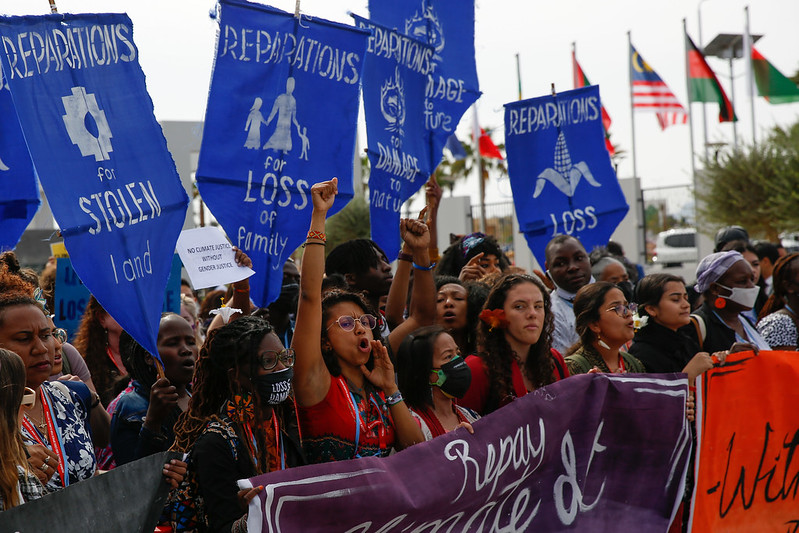Tina Landis is the author of the book Climate Solutions Beyond Capitalism.
Prior to the recently concluded 27th Conference of the Parties UN Climate Conference, the UN Emissions Gap Report was released, warning that current Nationally Determined Contributions have us on track for 2.4 C warming. In addition, current emission reduction policies are on track for 2.8 C warming – both of which spell catastrophe. Executive Director of the UN Environmental Program Inger Anderson said, “Only a root and branch transformation of our economies and societies can save us from accelerating climate disaster.”
At the same time, the World Meteorological Organization issued a report warning that carbon dioxide, as well as the even more potent greenhouse gases nitrous oxide and methane, reached record high concentrations in the atmosphere last year. The report also showed that the last eight years have each been warmer than all previous years on record.
The world is currently experiencing around 1.1 C warming over pre-industrial levels and we can see how disastrous that is. No matter where you live on the globe, climate impacts are becoming more severe and unpredictable, creating 21.5 million climate refugees since 2008 according to the UN Human Rights Commission.
The Lancet’s annual report on climate change and health, also released just prior to COP27, demonstrates the impacts on global populations. The report stated that heat-related deaths have increased by 68% since 2000, extreme heat is triggering 98 million cases of hunger globally and these higher temperatures have caused a 12% increase in mosquito-borne diseases. These numbers in reality are likely higher since the most vulnerable, hard to reach populations often go uncounted.
Despite the increasingly dire warnings from international scientific bodies, the COP27 climate summit yet again fell far short of the action that is needed to stem catastrophe. The feasibility of the 1.5 C warming threshold was even questioned due to the gap that exists between national commitments and the target. In the end, the 1.5 C target was upheld despite an unclear path to achieving this goal coming from the final agreement.
The main points of negotiation at this year’s conference were climate financing, loss and damage fund and phasing out fossil fuels. There was the hope that “phasing down,” or better yet, “phasing out fossil fuels” would be included in this year’s final agreement, but final language became watered down to “efforts towards the phasedown of unabated coal power and phase-out of inefficient fossil fuel subsidies” — which unfortunately leaves room for replacement of coal with other planet-warming fuels like natural gas. Shockingly, the words “fossil fuels” hadn’t even appeared in any UN climate agreement until last year’s COP26 agreement, so with a bar so low, this year was a small step forward.
To truly have good-faith negotiations as demanded by the Global South for decades, it is crucial that the legacy of colonialism and imperialism be taken into account in any agreements coming from COPs. Many countries are still struggling to bring electrification to more remote parts of their populations, and without technological and economic assistance, the Global South can’t rapidly transition to renewables and still meet the needs of their people. Many are crushed with IMF loan debt and stifling trade agreements that benefit and continue to enrich the wealthy countries. And with each climate disaster, developing countries struggle just to provide food and recovery for their people. They are not on the same level of development as the imperialist countries which control massive amounts of wealth globally and could use that wealth to assist the world in achieving sustainable development while immediately transitioning off fossil fuels domestically. This COP made some advancements toward addressing these disparities, but much more is needed if we are to overcome the climate crisis and maintain the 1.5 C target.
Climate financing was a commitment agreed upon in the 2015 Paris Agreement. Climate financing is essentially reparations to be paid to countries most vulnerable to climate change by wealthy countries that have contributed the most emissions since the Industrial Revolution. Wealthy nations had committed to pay $100 billion annually starting in 2020, but have so far failed to do so. These funds would be used by climate-vulnerable countries for mitigation measures to reduce greenhouse gases, as well as measures to adapt to climate impacts already unfolding.
One significant step forward in the COP27 agreement was the establishment of a loss and damage fund to assist vulnerable countries in recovery from climate disasters, including economic losses as well as loss of biodiversity and cultural heritage. Establishment of this fund has long been fought by the U.S. government and other wealthy countries since the first climate summit in 1992 out of fear of liability for climate impacts globally. In the final hours of negotiations that went into overtime, the U.S. delegation – which was the last one blocking the agreement despite taking the lead in per capita emissions today and historically — finally conceded to the demand.

The details of the loss and damage fund remain unclear with the appointment of a 24-country committee now tasked to determine which countries should contribute and where the money should go, leaving many skeptical. One sticking point for the EU and United States was that China should be considered a “developed” country and be forced to pay into the fund, although China had already agreed to voluntarily contribute. This ignores the legacy of underdevelopment that China is still working to overcome despite significant economic growth over the last few decades. For instance, China was only able to eradicate extreme poverty in 2021, uplifting the poorest 850 million of their population, but the country still remains at a great disadvantage when compared to the imperialist countries’ vast wealth.
The need to address this legacy was echoed by Brazilian president-elect Lula, who said in his speech, “The struggle against global warming is inseparable from the fight against poverty.” Our only hope for solving climate change is to end the imperialist world order, which would truly create the opening for international cooperation and sharing resources across borders to achieve sustainable development globally.
Lula became the “hero” of COP27, announcing plans to not only halt the deforestation of the Amazon that was greatly ramped up by his right-wing predecessor Bolsonaro, but also to build an alliance between all the South American countries of Amazonia to restore and protect this rainforest that is crucial to the health of the planet. The recent leftward shift in Latin American governments makes this plan an attainable reality.
Lula also plans to establish a Ministry of Indigenous People, reestablish and strengthen environmental regulations, enforcement and protections and resurrect the international Amazon Fund that Bolsonaro dismantled. At the G20 meeting held simultaneously in Bali, Lula signed a pact with the two other countries that hold the largest remaining rainforests — Indonesia and the Democratic Republic of the Congo — to establish financial mechanisms to halt deforestation. He also proposed that COP30 in 2025 be held in Brazil, setting the stage for further efforts to end deforestation globally, which is a key factor in rebalancing the climate and sequestering carbon from the atmosphere.
Generally, the most promising aspect of the UN climate summits are the protests of the people in the streets outside expressing the demands of the masses with the need for systemic change often at the forefront. Holding the climate summit in Egypt, where the repressive government bans demonstrations, made it impossible for the masses to voice their demands this year — which will likely be repeated next year at COP28 to be held in the equally repressive United Arab Emirates. The Egyptian government set up a “protest zone” far from the summit, allowing for only a few small protests, organized by conference participants inside the summit area.
The masses of people want real action on climate change. The people want the very real and attainable solutions to the crisis to be implemented, which these conferences fail time and again to achieve. The vehicle for transformational change will not come from these COP meetings that are dominated by the imperialist powers as well as the hundreds of fossil fuel lobbyists that are allowed to attend each year. Change will come through building a broad people’s movement across borders that demands real climate action and reparations, that recognizes the need for a socialist transformation of society to truly solve the crisis.






